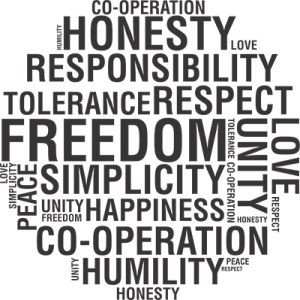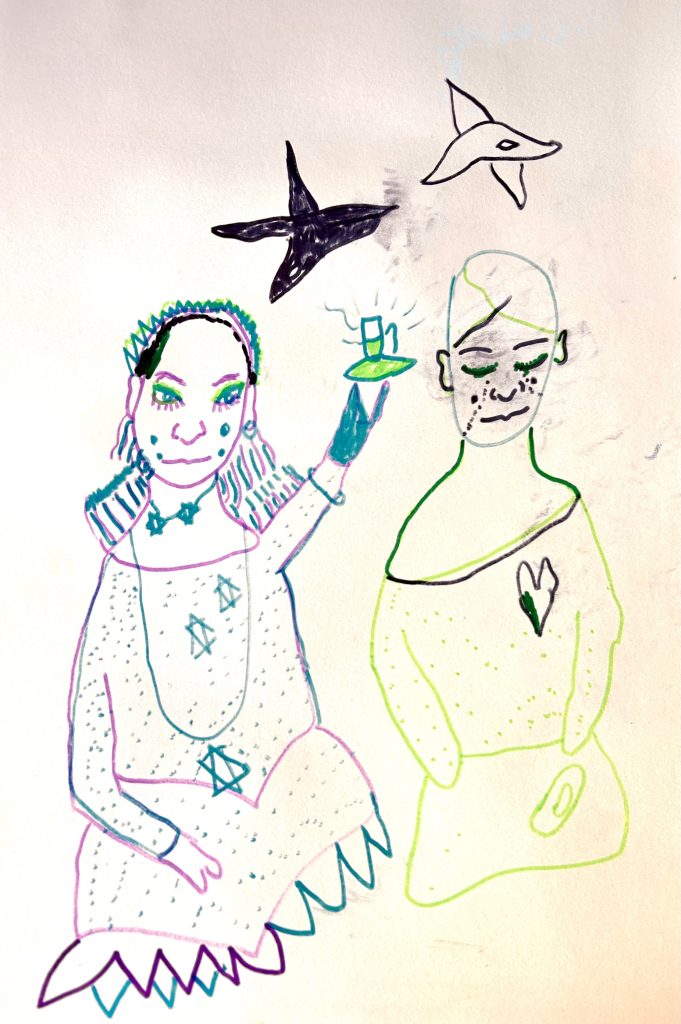Values as a Means to Invite Greater Depth
Value:
- the regard that something is held to deserve; the importance, worth, or usefulness of something.
- a person’s principles or standards of behavior; one’s judgment of what is important in life. – Lexicon by Oxford
Not everyone feels comfortable using ‘spirituality’ as a basis for their actions. The label ‘spiritual’ can mean many things and has often been corrupted and misused. Professed spirituality is sometimes used as a means to bypass actual engagement in situations of injustice. And in some settings, such as business or governance meetings, the word can be off-putting.
Certain values, on the other hand, are universal. Values represent qualities like respect, fairness, honesty, and love. Adhering to the ‘Golden Rule’, for example, common to nearly every spiritual tradition, does not require belief in a particular church or deity. Treating others as we wish to be treated is an ethical code for living, a universal value. Such values form identity and fuel purpose.
Of course, what a particular value means to an individual will be very personal, and will evolve over the course of their life. Sharing personal values and their meaning with others can start deep conversations and help to build trust.
 When values are fulfilled, we thrive. When somebody crushes them, we hurt. Often, it is precisely that hurt that inspires people to act. Many entrepreneurs, activists and change-makers are driven by a felt pain. They’re motivated by something they have experienced as wrong, and they want to make it better. Not just for themselves, but for everyone. They take action to address these pain points, bringing others along on that journey, creating ripples that can power positive change. Values ignite and fuel that journey, spiritual or not. And the end result, say getting a law passed that protects a vulnerable population, is just as meaningful whether the change-makers used a spiritual approach, or a secular one.
When values are fulfilled, we thrive. When somebody crushes them, we hurt. Often, it is precisely that hurt that inspires people to act. Many entrepreneurs, activists and change-makers are driven by a felt pain. They’re motivated by something they have experienced as wrong, and they want to make it better. Not just for themselves, but for everyone. They take action to address these pain points, bringing others along on that journey, creating ripples that can power positive change. Values ignite and fuel that journey, spiritual or not. And the end result, say getting a law passed that protects a vulnerable population, is just as meaningful whether the change-makers used a spiritual approach, or a secular one.
Values provide orientation when the bigger picture is still unclear. Systemic change has many dimensions and that can be confusing. Values offer a beacon. Are your goals and your values aligned? Are you moving toward your goal? Use values as a yardstick to start taking steps towards your goal and to keep adjusting and refining your approach.
Values connect people beyond the fault lines that often separate them. Connecting actions to universal values helps opposing sides find common ground, avoiding ‘turf wars’ between individuals and communities. It invites everyone involved to share and to contribute. By having deeper conversations around values, it becomes clearer how much there is that connects us; we are not as separate as we might think. For example, everyone wants safety for their children and family, and desires to be heard and understood. That’s often a good starting place in conflict resolution.
As people tap into their own core values, they want to live them in more authentic ways, and will gravitate towards others who share similar ideals and want to bring about similar changes. Some people will choose to contribute differently, and with the current state of the world, there’s plenty of room for personal choice and mutual respect.
Grounding actions in personal values allows us to explore deeply ‘within’ while engaging deeply in the outer world. At the same time, it is a practical approach to keep moving forward in complex situations that do not always value or require ‘spirituality’. Values are the universal foundation upon which everyone can build their contributions.






